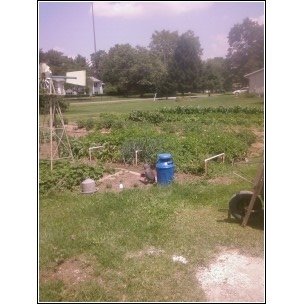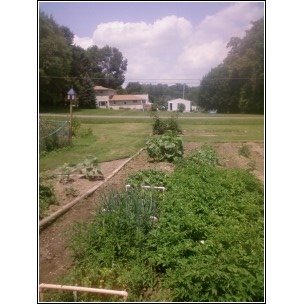Food For Thought
Over the past 6-8 months, I have made reading a daily ritual. We've managed to create quite a library on self suffiency/reliance, small scale farming, do-it-yourself, nutrition, and many others . The more I read, the more I am shocked about the food we eat as a country. The quantities are outrageous, and the quality is downright disgusting.
Ever since the industrial revolution, and even earlier, we have made ourselves want our food, like nearly everything else, something of instant gratification. We want food, and we want it now. We dont care where it origionally comes from, we dont generally care whats in it, we just want to go to the grocery store/supermondomarket, and get it NOW. Its far easier to visit one giant store and get everything we need, rather than visit the butcher, the farm market, the baker, and so on. We buy everything frozen, canned, pre-packaged, pre-cooked, with not a care in the world as to what its doing to us OR the enviornment.
Now is when I just toss out some food for thought. Go to the grocery store and look down the produce isle, and see how much is grown locally. Chances are, thats a big fat zero, zilch, zip, nadda thing. Most comes from the western united states, and even some from south america. How can fresh fruits and vegetables possibly survive this trip? Its simple. Most are picked well before maturity/ripening, then gassed or sprayed to force the ripening during the long haul to your grocer. ( then sprayed yet again for longer shelf life) Most are grown on giant industrial farms in whats generally called hothouses. Most "hothouse" vegetables have little to no flavor at all thanks to this forced method of growth and chemically altered ripening. If you compare, for instance,the flavor of a tomato from the grocery to one picked fresh off the vine, there IS no comparison. I have personally had some of these tomatos that tasted like nothing at all. Even most of the new trendy labeled "organic" vegetables are shipped in from all over the continent. Food loosed nutritional value the longer it is directly picked or pulled out of the soil, and most travels clear across the country, to a distributor, to the store, to our cart, to our home, and may spend days in the fridge before we eat it.
Also take into consideration the enviornmental impact of that whole process. Figure the amout of fuel used to get those tomatos to your plate. First, they are started from seed in a heated green or hothouse, the fields (if they're even used) are plowed by a tractor, the same tractor sprays pesticides and fertilizers on the plants, they are picked, loaded into trays, hauled to the truck by a tractor, loaded by a towmotor, and sent cross country in a refrigerated 18 wheeler. Try to figure the amount of fossil fuels used in this whole process and it will boggle your mind, then take into account the current prices of gas or diesel fuel. Enviornmentally, its astounding, and costly, we are paying for all of that fuel cost at the checkout. These giant industrial farms dont care about quality of a product, its the quantity that makes them money. They have to sell by the truckload to cover the fuel costs and still make a profit, and in the end, we pay that cost not only in dollars, but in quality.
There are several ways to avoid all of this. The first is not an option for everyone, but grow your own vegetables. Even if you just have a small yard or porch, you can grow SOMETHING. Anyone can grow a simple tomato plant in a pot on the porch and watch it grow, and eat the resulting fruits all summer long. Not only is it better quality, but its saving you a few bucks at the store. Plus the "woohoo look what I grew!" is more gratifying than you can imagine.
Second, buy locally. Most anywhere has some sort of a farmers market. Even if the sellers arent local as in 2 miles away, they're local as in the same state. At these markets, you can talk directly to the farmer and ask whats used on their produce. (pesticides, fertilizers, etc) The big boys dont sell at these markets, they would never make enough profit selling half a truckload over a weekend when they can do a truckload a day at the supermarket. Buying at these markets are generally a bit more expensive than at the supermarkets, but there is a lot to consider when looking at price. First and foremost is quality. Locally grown food is definitly more fresh and nutritious than something that just spent 4 days in a truck. Most is from smaller scale farms, family operated farms, farms that take pride in what they produce. Its much easier to pay a little extra for something when you personally meet the man who plowed the fields, planted, and harvested it. You're also supporting your local ecomomy when you buy at these markets, and in our world of supermondomarket chain stores full of shipped in produce and chinese made gadgets, thats a rare thing.
OK now for the third and hardest one on my list. Eat within the seasons! Its a hard concept to grasp with the broad choices at the store, but look at what you see LOCALLY in the markets and backyard gardens if you dont know. Food is not only something we require for life, but it is also a treat. Yes, a treat.
Imagine all of your favorite holiday treats; thanksgiving turkey, christmas cookies, easter candy, then imagine what it would be like if you had these every day. They would lose their novelty and that anticipation of waiting till next years batch of grandmas holiday struedle. Like the things I have just mentioned, fruits and vegetables can be no different. It wasnt that long ago that there was no choice in this. Our parents didnt get tomatos in january or strawberries in december, they waited for the season. Each season brings its own batch of fruits or vegetables, fall corn, sweet wintered carrots, spring greens, and the biggest of all, the huge selection from mid spring to early fall. There is a big amount of joy in eating within the seasons. Its the anticipation of waiting for those tiny white buds behind the house producing the first cherry tomato of the year. You smile as you pick it, whipe it off and toss it in your mouth. You sware this is the best tomato you have ever eaten.
As we grow more into this fast paced, lazy, instant gratification life, we lose all touch with our food. We gorge on junk food, and things filled/sprayed/treated with unknown amounts of chemicals, color dyes, and preservitives. Our waists grow as our health declines. Since 1970, the average calorie intake of US citizens has risen from roughly 2250 per day to nearly 3000. The average meat consumption has also risen per person since 1950, from 137 pounds to 195 pounds. In the same time span, consumption of sweeteners has risen from 108 to 195 pounds per person, and the consumption of fats and oils has also risen, from 40 to nearly 80 pounds. We've lost all touch with eating fresh food. We've lost all touch with eating healthy. As we eat the way we do, healthcare costs soar. Sure, we can put some mimimal blame on the medical field and pharmacutical companies, but its high time we looked down at our own plates.
Subscribe to:
Post Comments (Atom)
Blog Archive
-
►
2019
(1)
- ► Apr 7 - Apr 14 (1)
-
►
2016
(1)
- ► Jan 31 - Feb 7 (1)
-
►
2013
(1)
- ► Sep 1 - Sep 8 (1)
-
►
2012
(3)
- ► Jun 10 - Jun 17 (1)
- ► Jun 3 - Jun 10 (2)
-
►
2011
(17)
- ► Nov 27 - Dec 4 (1)
- ► Nov 20 - Nov 27 (1)
- ► Nov 13 - Nov 20 (1)
- ► Oct 2 - Oct 9 (1)
- ► Jul 24 - Jul 31 (1)
- ► Jun 12 - Jun 19 (1)
- ► Mar 27 - Apr 3 (1)
- ► Mar 20 - Mar 27 (2)
- ► Mar 13 - Mar 20 (3)
- ► Mar 6 - Mar 13 (2)
- ► Feb 27 - Mar 6 (3)
-
►
2010
(51)
- ► Dec 5 - Dec 12 (1)
- ► Nov 7 - Nov 14 (3)
- ► Aug 29 - Sep 5 (1)
- ► Aug 15 - Aug 22 (1)
- ► Aug 1 - Aug 8 (1)
- ► Jul 25 - Aug 1 (1)
- ► Jul 18 - Jul 25 (1)
- ► Jul 11 - Jul 18 (1)
- ► Jun 27 - Jul 4 (1)
- ► Jun 20 - Jun 27 (2)
- ► Jun 13 - Jun 20 (2)
- ► Jun 6 - Jun 13 (3)
- ► May 30 - Jun 6 (1)
- ► May 23 - May 30 (2)
- ► May 16 - May 23 (1)
- ► May 9 - May 16 (1)
- ► May 2 - May 9 (2)
- ► Apr 11 - Apr 18 (2)
- ► Apr 4 - Apr 11 (3)
- ► Mar 28 - Apr 4 (2)
- ► Mar 21 - Mar 28 (1)
- ► Mar 14 - Mar 21 (3)
- ► Mar 7 - Mar 14 (2)
- ► Feb 28 - Mar 7 (2)
- ► Feb 21 - Feb 28 (1)
- ► Feb 14 - Feb 21 (1)
- ► Feb 7 - Feb 14 (1)
- ► Jan 31 - Feb 7 (1)
- ► Jan 24 - Jan 31 (1)
- ► Jan 17 - Jan 24 (1)
- ► Jan 10 - Jan 17 (3)
- ► Jan 3 - Jan 10 (2)
-
►
2009
(100)
- ► Dec 27 - Jan 3 (2)
- ► Dec 20 - Dec 27 (1)
- ► Dec 13 - Dec 20 (1)
- ► Dec 6 - Dec 13 (1)
- ► Nov 29 - Dec 6 (1)
- ► Nov 22 - Nov 29 (2)
- ► Nov 15 - Nov 22 (1)
- ► Nov 8 - Nov 15 (2)
- ► Nov 1 - Nov 8 (1)
- ► Oct 18 - Oct 25 (1)
- ► Oct 11 - Oct 18 (1)
- ► Oct 4 - Oct 11 (1)
- ► Sep 20 - Sep 27 (1)
- ► Sep 13 - Sep 20 (4)
- ► Aug 30 - Sep 6 (2)
- ► Aug 23 - Aug 30 (2)
- ► Aug 16 - Aug 23 (2)
- ► Aug 9 - Aug 16 (2)
- ► Aug 2 - Aug 9 (2)
- ► Jul 26 - Aug 2 (2)
- ► Jul 19 - Jul 26 (4)
- ► Jul 12 - Jul 19 (2)
- ► Jul 5 - Jul 12 (2)
- ► Jun 28 - Jul 5 (2)
- ► Jun 21 - Jun 28 (1)
- ► Jun 14 - Jun 21 (2)
- ► Jun 7 - Jun 14 (1)
- ► May 24 - May 31 (2)
- ► May 17 - May 24 (2)
- ► May 10 - May 17 (2)
- ► May 3 - May 10 (1)
- ► Apr 26 - May 3 (2)
- ► Apr 19 - Apr 26 (2)
- ► Apr 12 - Apr 19 (4)
- ► Apr 5 - Apr 12 (2)
- ► Mar 29 - Apr 5 (1)
- ► Mar 22 - Mar 29 (2)
- ► Mar 15 - Mar 22 (4)
- ► Mar 8 - Mar 15 (4)
- ► Mar 1 - Mar 8 (2)
- ► Feb 22 - Mar 1 (2)
- ► Feb 15 - Feb 22 (4)
- ► Feb 8 - Feb 15 (4)
- ► Feb 1 - Feb 8 (4)
- ► Jan 18 - Jan 25 (5)
- ► Jan 11 - Jan 18 (3)
- ► Jan 4 - Jan 11 (2)
-
▼
2008
(63)
- ► Dec 28 - Jan 4 (3)
- ► Dec 21 - Dec 28 (1)
- ► Dec 14 - Dec 21 (3)
- ► Nov 30 - Dec 7 (2)
- ► Nov 23 - Nov 30 (2)
- ► Nov 16 - Nov 23 (1)
- ► Nov 9 - Nov 16 (2)
- ► Oct 26 - Nov 2 (2)
- ► Oct 19 - Oct 26 (3)
- ► Oct 12 - Oct 19 (3)
- ► Oct 5 - Oct 12 (5)
- ► Sep 28 - Oct 5 (1)
- ► Sep 21 - Sep 28 (1)
- ► Sep 14 - Sep 21 (1)
-
▼
Sep 7 - Sep 14
(33)
- Busy Weekend
- September 8th 2008
- August 27th 2008
- August 26th 2008
- Entry for August 25, 2008Today I decided to take a...
- August 19th 2008
- August 17th 2008
- August 4th 2008
- July 25th 2008
- July 4th 2008
- Home again early today, thanks to no materials.......
- Finally!!! I got the old loboy home!Yesterday morn...
- June 11 2008
- Today I snuck outta work a bit early to try to get...
- June 3rd 2008
- Entry for April 23, 2008Yesterday was another prod...
- from April 21, 2008
- Entry for April 18, 2008Of course, no work again t...
- April 17,2008
- Entry for April 14, 2008I havent written here for ...
- Entry for April 09, 2008Yet again yesterday, work ...
- still more
- from April 6, 2008
- long repost from april 5, 2008
- still reposting lol
- repost from march 29,2008
- another!
- still going
- another
- and another repost
- another repost
- repost from old blog
- First Posting Here










No comments:
Post a Comment